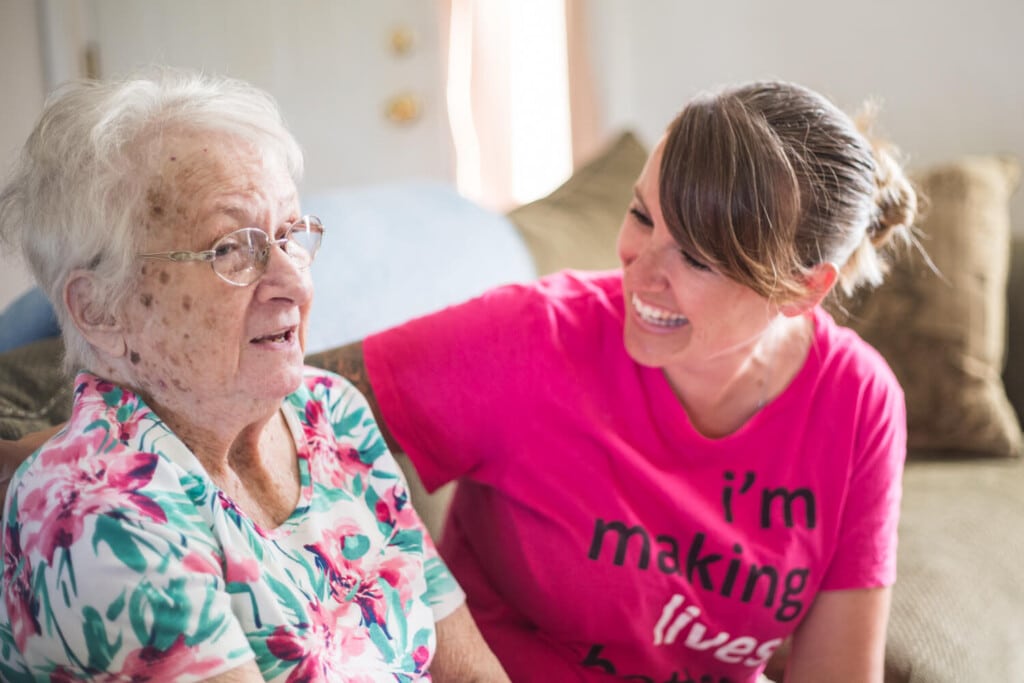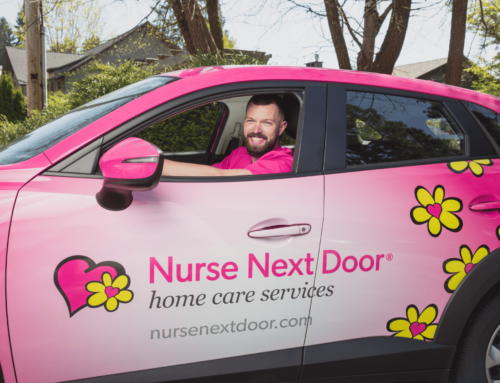Nursing is a demanding profession, and many nurses feel burnout or crave new challenges. The opportunities are endless if you’re considering a new career path or are eager to apply your healthcare skills in a different role.
Nurses possess excellent communication and problem-solving skills and are resilient and adaptable—all traits that make great entrepreneurs. By identifying a niche and leveraging your unique nursing experience, you can set yourself up for success. Passion is key, so choose an area you’re interested in innovating.
What is a Nurse Entrepreneur?
A nurse entrepreneur is a nurse who starts their own business or venture in healthcare or related fields. The perfect nurse entrepreneur is a leader with vision and a passion for better patient care. You’re innovative, adaptable, and resilient—you don’t back down from challenges. Instead, you persevere through obstacles to bring your vision to life.
Nurse entrepreneurs leverage their clinical expertise in new ways, from developing healthcare products to offering specialized services, all while maintaining the caring mindset of a nurse.
Transitioning From Nurse to Entrepreneur
Moving from a clinical nursing role to running a business means shifting from providing care to leading a venture. It’s an exciting yet intimidating change, but remember, you’re not alone. Here are some top tips for nurses becoming entrepreneurs:
- Pinpoint Your Niche: Identify what you’re passionate about within healthcare. Is it senior home care, wellness coaching, education, or a health tech solution? Focusing on a niche you care about will drive your motivation.
- Market Insight: Conduct thorough research to understand your community’s needs and how your business could meet them. Look for gaps in services or problems you can solve.
- Craft a Business Plan: Outline your vision, target market, services, marketing strategy, and financial projections. A solid business plan is your roadmap to guide growth and attract potential investors or partners.
- Leverage Resources: To build your entrepreneurial skillset, utilize online platforms like LinkedIn for networking and Coursera for business or healthcare courses. You can also find free resources on writing business plans and securing funding.
- Join Professional Networks: Connect with organizations like the American Nurses Association (ANA) or the National Nurse Practitioner Entrepreneur Network (NNPEN). These communities offer support, mentorship, and resources for nurse entrepreneurs.
- Training and Development: Seek out mentorship programs and workshops tailored to healthcare professionals starting businesses. Learning from others who have done it can accelerate your success.
Embrace the entrepreneurial spirit and start building a business that leverages your nursing skills in new, impactful ways. Now, let’s explore the top nurse entrepreneur business ideas and how to make them a reality.
Top Nurse Entrepreneur Business Ideas
These innovative ideas range from healthcare services to education and consulting. Each idea includes details, potential earnings, and tips to help you get started on your nurse entrepreneurship journey.
1. Start a Homecare Service
Starting your own home health care service lets you deliver valuable care to patients in the comfort of their homes. Homecare is a booming industry—the North American senior care industry is growing fast, and by 2030, 1 in every 6 people will be a senior citizen. This aging population means the demand for in-home care is higher than ever.
You can build an independent homecare agency or partner with a reputable company like Nurse Next Door as a franchisee. As a homecare business owner, you might coordinate at-home nursing services for seniors or patients recovering from surgery. For example, you could offer:
- Post-Surgery or Chronic Care: Nurses visit patients to monitor health, manage medications, and prevent hospital readmissions.
- Hospice or Palliative Care: Provide compassionate end-of-life care and support to patients and families (hospice caregivers are especially in demand as the senior population grows).
- Pediatric Home Health: Specialized pediatric nurses can care for children with complex medical needs at home, reducing hospital stays.
To get started, ensure you understand your state’s licensing requirements for home health agencies and develop care protocols. Hiring qualified caregivers or partnering with other healthcare professionals will be key.
Many nurse entrepreneurs choose the franchise route in home care because it offers a ready-made business model and support system. Whether you build your own brand or join an established franchise, this business allows you to apply your nursing expertise to help clients maintain independence at home.
2. Become a Specialized Care Provider
If you are passionate about a particular nursing field, consider becoming a specialized care provider or consultant in that niche. Specialized nursing roles often rank among the highest-paying jobs in nursing, and they offer opportunities to apply deep expertise in private practice.
Here are a few in-demand specializations nurse entrepreneurs are pursuing:
Childbirth and Postpartum Services
Many labor and delivery nurses venture into entrepreneurship as childbirth educators, doulas, or lactation consultants. You could open a practice that guides parents through fertility, pregnancy, childbirth, and newborn care. For instance, offer prenatal classes, breastfeeding support, or postpartum home visits.
You might focus on one specialty or build an agency that covers the full spectrum to support families on their journey to parenthood. Given the constant need for education and support around childbirth, this niche can be both fulfilling and financially sustainable.
Holistic Nursing
If you’re passionate about alternative and holistic care, consider becoming a holistic nurse provider. Holistic nurses treat the whole person (mind, body, spirit) using complementary therapies like aromatherapy, massage, or wellness coaching. There are many directions to take this business and customize care for each patient’s needs.
While obtaining a holistic nursing certification can bolster your credibility, it’s not always required. A valid RN license in your state is often enough to practice according to the American Holistic Nursing Association. You might offer stress management programs, integrative health consultations, or community wellness workshops.
Telehealth Services
In the wake of the COVID-19 pandemic, telehealth has become mainstream, and up to 76% of patients are interested in virtual healthcare services. Nurse entrepreneurs can capitalize on this by starting a telehealth nursing practice. For example, you could provide remote patient monitoring, virtual lactation consulting, diabetes education, or mental health check-ins via video calls.
Telehealth nursing offers greater flexibility with scheduling and work-life balance—you can often work from home on your schedule while extending care to patients in underserved or rural areas. To succeed, ensure you choose a reliable telehealth platform and comply with patient privacy laws. Telehealth is a rapidly growing niche that lets you reach a broader client base without a physical office.
3. Open a Medical Spa
Combine your healthcare knowledge with the booming beauty and wellness industry by opening a medical spa (med spa). A med spa offers aesthetic and wellness treatments—like laser therapies, Botox injections, IV vitamin infusions, or skin rejuvenation—under medical oversight.
Today’s health-conscious consumers love services that help them look and feel their best. With the growing demand for cosmetic treatments, medical spas are among the most profitable nurse-run businesses. On average, medical spa owners make between $300,000 and $375,000 per year (with 10–20% profit margins).
To start a med spa, you’ll need to navigate regulations—many states require a collaborating physician or nurse practitioner if you’ll perform medical procedures. Craft a strong marketing strategy emphasizing your unique clinical expertise and spa luxury blend. Invest in quality training for any treatments you plan to offer (for example, certification in medical aesthetics or laser therapy).
Strategic marketing and client trust will help set you apart in this competitive field. With the right approach, a medical spa can be highly lucrative and allow you to blend nursing with entrepreneurship creatively.
4. Work as a Freelance Nurse Writer
Not all nurses thrive in a busy clinical environment. If you have a knack for communication, consider becoming a freelance nurse writer or medical writer. This career path lets you use your medical knowledge to create valuable content for healthcare websites, blogs, journals, educational materials, and more.
From writing patient education brochures to authoring articles in nursing magazines, there’s a growing demand for medically knowledgeable writers who can translate complex health information into clear, engaging content.
As a freelance writer, you can choose your projects, topics, and work hours. You might write continuing education courses for nurses, create content for pharmaceutical companies, or even start your own nursing blog. Leverage your clinical experience to write with authority and accuracy, and tailor your writing to different audiences (patients vs. professionals) to stand out from generic writers. Common types of nurse writing opportunities include:
- Medical Copywriting: Craft marketing materials, product guides, or website copy for healthcare organizations
- Journal and Research Writing: Contribute to nursing journals or help write up clinical research studies.
- Patient Education: Develop educational handouts, how-to guides, or online resources to help patients understand their conditions and treatments.
- Grant Writing: Write grant proposals for healthcare nonprofits or research institutions.
Earnings for nurse writers vary by project, but many nurse writers make around $80,000 per year on average, with experienced writers or those in specialized niches earning more.
To start, build a portfolio of writing samples (you can start with a personal blog or guest posts) and consider taking a medical writing course to hone your skills. Freelance writing is a flexible way to stay in healthcare while enjoying a creative, self-directed career.
5. Become a Legal Nurse Consultant
As a legal nurse consultant (LNC), bridge the gap between healthcare and law. In this role, experienced nurses provide crucial medical insights for legal cases. For example, attorneys might hire you to review medical records, explain healthcare standards, or even provide expert testimony in court.
This business is ideal for nurses with strong clinical backgrounds and an interest in justice. As an LNC, you’ll work with lawyers, insurance companies, or forensic teams to help evaluate cases related to medical malpractice, personal injury, worker’s compensation, and more.
One of the perks of legal nurse consulting is flexibility—you can work independently on a contract basis, often from home, and choose cases that interest you. Startup costs are relatively low—many LNCs simply need a home office and a network of attorney contacts.
Maintaining your RN license and clinical expertise is essential. While not required, obtaining a Legal Nurse Consultant Certified (LNCC) certification can boost your credibility. To sit for the LNCC exam, nurses typically need an active RN license plus 2,000 hours of clinical experience in the past 5 years.
Legal nurse consultants are well-compensated. On average, they earn around $87,000 per year in the United States, with highly experienced consultants or those in complex litigation earning up to six figures.
To get started, consider training through programs or workshops offered by professional LNC organizations and start networking with local law firms. This career allows you to leverage your nursing knowledge in a new way while playing a role in the legal process.
6. Enter Medical Product Sales
If you’re excited by cutting-edge medical technology and enjoy connecting with people, a career in medical product sales could be a perfect entrepreneurial venture. This path involves selling healthcare products or devices—such as medical equipment, pharmaceuticals, or software—to hospitals, clinics, and consumers.
It’s where healthcare meets business, and nurses can excel by using their clinical insight to educate customers about a product’s benefits. As a nurse in medical sales, you understand the needs of healthcare providers and patients, giving you an edge in demonstrating how a product solves real-world health problems.
Opportunities in this field include becoming an independent sales representative for a medical device company, launching a business reselling specialized medical supplies, or even inventing and marketing your own product. For example, you might start a company selling user-friendly home health monitors or become a distributor for an innovative wound care dressing. You’ll need to be adaptable and self-motivated – sales is a competitive arena that requires persistence in meeting targets and refining your approach to meet clients’ needs.
Medical sales can offer substantial earnings. As of 2024, the average yearly pay for a medical sales representative in the U.S.is about $87,398, and top performers who build strong client networks can earn much more with commissions.
To succeed, leverage your clinical credibility when talking to clients and continuously educate yourself on the latest products and market trends. This career lets you make a broad impact by introducing innovations that improve patient care, all while enjoying the entrepreneurial challenge of sales.
7. Health Educator and Content Creator
In the age of social media and online learning, content creation has become an exciting avenue for nurse entrepreneurs. Nurses are poised to become health educators, influencers, or content creators, sharing their knowledge with a broad audience.
Popular figures like Doctor Mike and Miki Rai have proven that there’s a massive audience for authentic healthcare voices on YouTube, Instagram, TikTok, and blogs. By creating educational videos, podcasts, or articles, you can build a following and combat the rampant misinformation online with reliable, nurse-approved information.
Once you grow an audience, there are many ways to monetize content: through ad revenue on YouTube, sponsored posts or partnerships with health brands, affiliate marketing, or even paid subscriptions for premium content. Some nurse content creators also host webinars or are invited to speak at events.
The earning potential is promising, ranging from a few hundred to several thousand dollars per month, depending on your follower count and engagement. Importantly, this is a flexible business; you can start part-time as a side hustle while still working your nursing job.
To get started, all you need is a niche topic you’re passionate about (e.g., pediatric health tips, critical care nursing insights, holistic wellness), a decent computer or smartphone, and consistency in posting content. Engage with your audience by answering questions and staying current with healthcare trends.
Building a following takes time, but as a nurse, your credibility and compassion give you a strong foundation to connect with viewers. Over time, you could turn your platform into a full-fledged business that generates income and elevates public health knowledge.
8. Launch a Health Coaching Service
Health coaching has exploded in popularity as people become more proactive about wellness. Nurses make excellent health and wellness coaches with their clinical background and patient-centered approach.
In this business, you’ll work with clients (individuals or groups) to help them achieve their health goals—managing weight, improving nutrition, reducing stress, or living better with a chronic condition. You might offer one-on-one coaching sessions, group wellness programs, or corporate wellness consulting. The health coaching industry is booming, valued at around $7.6 billion in the U.S., and growing steadily.
Nurses have an advantage in this field because you can blend medical knowledge with personalized support. As a health coach, you’ll assess clients’ lifestyles, create achievable wellness plans, provide education, and serve as an accountability partner. F
or example, you might coach a client on managing their diabetes through diet and exercise between doctor’s visits or run a holistic stress-reduction workshop for healthcare workers. Virtual coaching is also common – you can conduct sessions via phone or video, broadening your reach.
Many successful nurse health coaches pursue certification (such as becoming a Certified Health Coach through organizations like ACE or NSHC) to sharpen their coaching skills and add credibility, although it’s not strictly required.
Income can vary widely: some coaches charge hourly rates (e.g., $50–$200 per session) or sell monthly packages. According to industry data, certified health coaches earn around $63,318 per year on average, though top coaches or those with specialized niches can earn more.
To thrive, focus on a specific audience (for instance, coaching busy moms or employees in high-stress jobs) and build a program that delivers results. With your nursing background, you’ll be well-equipped to guide clients safely toward healthier lifestyles while running a rewarding business.
9. Start a Nursing Staffing Agency
Healthcare facilities constantly need qualified nurses, and staffing shortages are an ongoing challenge. This opens the door for nurse entrepreneurs to start a nurse staffing agency.
In this business, you act as the connector between healthcare providers (hospitals, nursing homes, clinics) that need staff and nurses seeking work. Given the current climate—the U.S. is projected to need over 275,000 additional nurses by 2030—a staffing agency can provide critical solutions while creating a profitable enterprise for you.
There are a few models you could pursue:
- Temporary staffing: supplying travel nurses or per diem nurses to cover short-term gaps.
- Permanent placement recruiting: finding full-time hospital hires, earning a commission per hire, or a mix of both.
The healthcare staffing market is huge, with the U.S. healthcare staffing industry valued at around $20 billion in 2022 and growing annually. Specialized niches are also increasing; for example, the market for per diem (on-call) nurse staffing is expected to reach $16+ billion by 2033.
Starting a staffing agency will involve setting up a business entity, ensuring you meet any state regulations for employment agencies, and building a network of reliable nurses and healthcare facility clients. As a nurse, you understand the qualifications and soft skills a good nurse must have, which helps in screening and matching candidates.
Revenue comes from fees charged to the facility—either a percentage of the nurse’s pay or a flat finders’ fee. Successful nurse staffing entrepreneurs often emphasize excellent customer service and quick response times to stand out since patient care can’t wait. With the nursing shortage persisting, a staffing agency offers high income potential and helps improve healthcare delivery by ensuring facilities are adequately staffed.
10. Provide Nursing Education & Training
Nurses are lifelong learners, and you can build a business helping other healthcare professionals (or aspiring ones) gain knowledge and skills. Consider starting a nursing education and training service. This could take many forms, such as offering continuing education (CE) courses, exam prep classes for nursing students, certification training (e.g., CPR, ACLS), or patient education workshops in the community.
Since most states require nurses to complete continuing education every 2–3 years for license renewal, there’s a built-in demand for quality educational content and courses.
As a nurse entrepreneur in education, you might develop online CE modules on specialized topics (earning revenue through course fees or subscriptions) or host in-person seminars and conferences. For example, you could run a weekend workshop for IV therapy certification or an online review course for the NCLEX-RN exam for nursing graduates.
If you have an advanced degree or specialty, you could contract with hospitals to provide staff training in that area (e.g., infection control updates, diabetes management best practices). Another niche is first aid and CPR training for schools, businesses, or the general public—many nurses successfully run training businesses certifying others in life-saving skills.
To stand out, ensure your courses are engaging and up-to-date with the latest guidelines. You may need to get your CE courses approved by a state nursing board or an accrediting body, but once approved, you can market them widely. Partnerships can help too – for instance, team up with other healthcare experts to broaden your course offerings.
Earnings in this field depend on scale: you might charge individuals per class or secure corporate contracts. If done well, it’s possible to generate a steady income, especially as your reputation grows. Beyond earnings, this path is highly rewarding – you’ll directly advance the profession and empower fellow nurses with new skills.
How to Start Your Own Healthcare Business
Once you’ve chosen a business idea, it’s time to consider how to launch your venture. In general, you have two pathways: open a franchise or start from scratch. Each has its advantages and challenges.
Building a Franchise
Partnering with an established company as a franchisee can be a less risky route into business ownership. You buy the rights to operate under a proven brand and system in a franchise model.
The initial investment is higher (franchise fees and startup costs), but you get a turnkey business with training, marketing support, and a playbook for success. For example, if you franchise with Nurse Next Door, you can access our brand reputation, care protocols, and ongoing support while providing care services in your community. This support and structure can help you overcome early challenges and make an impact faster.
Franchises can be very rewarding. The financial potential is solid because you’re working with a proven model—a study found that senior care franchise owners earn an average of $155,000 annually (though it may take time to reach this level).
As a franchisee, you’ll need to adhere to the franchisor’s guidelines, pay royalties, and sometimes purchase supplies from approved vendors. The trade-off is that you’re not starting alone; you have a network and a blueprint. For many nurse entrepreneurs who want to focus on delivering care rather than reinventing business systems, franchising is an appealing option.
Starting a Business From Scratch
Launching your own nursing business from the ground up offers complete creative control—you get to build your company exactly as you envision. This path is ideal if you have a unique concept or prefer independence over following a franchise model. You’ll develop your own brand, craft specialized services, and create a personalized approach to care that reflects your values.
However, with great freedom comes great responsibility. Starting from scratch means facing significant challenges: You must conduct extensive market research, write and execute a thorough business plan, and navigate complex regulatory requirements on your own. Securing funding can also be tougher for a brand-new concept without an established track record.
Marketing and client acquisition will be one of your primary tasks. Unlike a franchise, you won’t have instant brand recognition, so you’ll need to build that trust in your community through consistent marketing and networking.
Operational challenges like hiring and training staff, managing day-to-day finances, and ensuring all legal compliance (licenses, insurance, certifications) fall entirely on your shoulders. It can be overwhelming without support, so it’s wise to seek mentors or advisors in the industry who can guide you.
Despite the hurdles, starting from scratch can be immensely gratifying. You have the freedom to innovate and pivot your business as you learn what works, and ultimately, the venture’s success is a testament to your vision and dedication.
Is It Better to Start My Own Business From Scratch or Buy a Franchise?
It depends on your goals and risk tolerance. Starting from scratch gives you full control and creativity—you can freely develop your own brand and services.
This is great if you have a unique idea or want independence, but it also means building everything yourself—business plan, marketing, client base, and operations. It can be more challenging and risky since you don’t have an established reputation to lean on and must troubleshoot problems solo. On the upside, you won’t pay franchise fees; all your profits belong to you.
On the other hand, buying a franchise means launching a business with a proven model and support system behind you. For example, joining a home care franchise like Nurse Next Door gives you instant brand recognition, training, and ongoing support in critical areas like marketing and operations. This can significantly reduce the risk and learning curve.
However, franchises come with costs: an upfront franchise fee, royalties on revenue, and rules you must follow. You’ll have less flexibility to change the business model since you need to adhere to the franchisor’s successful formula.
In summary, starting from scratch might be better if you value autonomy and have a clear vision—just be prepared to work hard on building the business foundation. If you prefer a support network and a playbook for success, a franchise can offer a “business in a box,” which is especially helpful if you’re new to entrepreneurship.
Many nurse entrepreneurs find franchises in senior care, staffing, or wellness to be a good middle ground where they run a business but have readily available mentorship. Consider your personal working style and the specific opportunity, conduct thorough research on any franchise, and likewise, draft a strong plan if you go it alone.
Become a Nurse Entrepreneur with Nurse Next Door
More than ever, the healthcare world needs innovation and personalized care, and nurses are the perfect people to fill this gap. Nurses can transform healthcare delivery by stepping out of traditional roles and into entrepreneurship.
From providing one-on-one care to leading teams and creating services, becoming a nurse entrepreneur is an opportunity to grow professionally while making a real difference in your community.
If you’re inspired to take the leap, consider starting your journey with support. Nurse Next Door is one example of a platform for nurses looking into home care entrepreneurship. As a Nurse Next Door franchise owner, you join a team dedicated to “making lives better” by delivering compassionate care to seniors at home.
Turn your nursing skills into a successful business with a strong support system backing you every step of the way. It’s a chance to be your own boss and improve healthcare on your own terms without feeling alone.
Nurse Entrepreneur FAQ
Q: Can I start a nurse-focused business while still working full-time?
A: Yes. Many nurses begin their businesses as side hustles while keeping their day jobs. Dedicate a few hours each week to your venture. When it grows and becomes stable, you can consider moving to it full-time.
Q: Do I need special certifications or licenses to become a nurse entrepreneur?
A: Not usually. Aside from your RN license (needed for clinical work), most ideas don’t require new permits. Some fields offer optional certifications (like legal consulting or health coaching) to boost credibility. Check if you need a general business license or insurance for your venture.
Q: How do I find clients or market my nurse-run business?
A: Use your network and online presence. Tell colleagues and local healthcare providers about your services. Create a simple website or social media page to reach more people. Providing excellent service encourages word-of-mouth referrals.
Ready to Explore Life as a Nurse Entrepreneur?
Take that first step—whether it’s drafting a business plan or requesting information from a nurse-focused franchise—and turn your hard-earned nursing experience into an exciting venture. Let’s change healthcare together, making lives better for seniors at home, one step at a time.

 x
x











